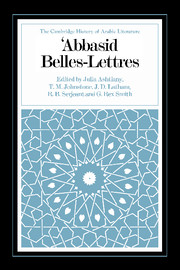Book contents
- Frontmatter
- The ʿAbbasid Caliphate: a historical introduction
- 1 Adab and the concept of belles-lettres
- 2 Shuʿūbiyyah in Arabic literature
- 3 Ibn al-Muqaffaʿ and early ʿAbbasid prose
- 4 Al-Jāḥiẓ
- 5 Al-Ṣaḥib Ibn ʿAbbād
- 6 Abū Ḥayyān al-Tawḥīdī
- 7 Al-Hamadhānī, al-Ḥarīrī and the maqāmāt genre
- 8 Fables and legends
- 9 ʿAbbasid poetry and its antecedents
- 10 Hunting poetry (ṭardiyjāt)
- 11 Political poetry
- 12 Love poetry (ghazal)
- 13 Wine poetry (khamriyyāt)
- 14 Mystical poetry
- 15 Ascetic poetry (zuhdiyyāt)
- 16 Bashshār b. Burd, Abū ʾl-ʿAtāhiyah and Abū Nuwās
- 17 Al-Mutanabbī
- 18 Abū Firās al-Ḥamdānī
- 19 Abū ʾl-ʿAlāʾ al-Maʿarrī
- 20 Literary criticism
- 21 Ibn al-Muʿtazz and Kitāb al-Badīʿ
- 22 Regional literature: Egypt
- 23 Regional literature: the Yemen
- Appendix: Table of metres
- Bibliography
- Index
14 - Mystical poetry
Published online by Cambridge University Press: 28 May 2012
- Frontmatter
- The ʿAbbasid Caliphate: a historical introduction
- 1 Adab and the concept of belles-lettres
- 2 Shuʿūbiyyah in Arabic literature
- 3 Ibn al-Muqaffaʿ and early ʿAbbasid prose
- 4 Al-Jāḥiẓ
- 5 Al-Ṣaḥib Ibn ʿAbbād
- 6 Abū Ḥayyān al-Tawḥīdī
- 7 Al-Hamadhānī, al-Ḥarīrī and the maqāmāt genre
- 8 Fables and legends
- 9 ʿAbbasid poetry and its antecedents
- 10 Hunting poetry (ṭardiyjāt)
- 11 Political poetry
- 12 Love poetry (ghazal)
- 13 Wine poetry (khamriyyāt)
- 14 Mystical poetry
- 15 Ascetic poetry (zuhdiyyāt)
- 16 Bashshār b. Burd, Abū ʾl-ʿAtāhiyah and Abū Nuwās
- 17 Al-Mutanabbī
- 18 Abū Firās al-Ḥamdānī
- 19 Abū ʾl-ʿAlāʾ al-Maʿarrī
- 20 Literary criticism
- 21 Ibn al-Muʿtazz and Kitāb al-Badīʿ
- 22 Regional literature: Egypt
- 23 Regional literature: the Yemen
- Appendix: Table of metres
- Bibliography
- Index
Summary
GENERAL NOTIONS
The word ṣūfī – usually derived from ṣūf (wool), supposedly in reference to the coarse woollen garments of the early Muslim mystics – does not appear to have been yet in use at the outset of the āAbbasid period, but for the sake of uniformity it will be used here throughout – if need be retrospectively – in the sense of “Muslim mystic”. The mystic has by definition one interest only; Sufi poetry is thus centred, explicitly or implicitly, on the eternal and infinite source from which the soul of the poet originated and to which it seeks to return. There is no difficulty in understanding this; but, before we go on to a separate consideration of individual authors, it is imperative to comment on two general points which are often misunderstood. One of these is the state of spiritual expectancy, poised between longing and patience, a state epitomized in the following distich attributed by Sufis to the Baghdadi mystic Abū Bakr al-Shiblī, (d. 334/945), though in fact al- Shiblī is probably quoting from the second /eighth-century poet Bashshār b. Burd, or possibly from ʿAbd al-Ṣamad al-Raqāshā (d. c. 200/815-16) to whom the lines, with some variants, are also attributed:
One day a cloud from Thee o'ershadowed us,
dazzled us with its lightning, but held back its rain;
And its darkness cleareth not away, for the eager to despair,
nor cometh the downpour for the thirsty to drink.
- Type
- Chapter
- Information
- Abbasid Belles Lettres , pp. 235 - 264Publisher: Cambridge University PressPrint publication year: 1990
- 1
- Cited by



